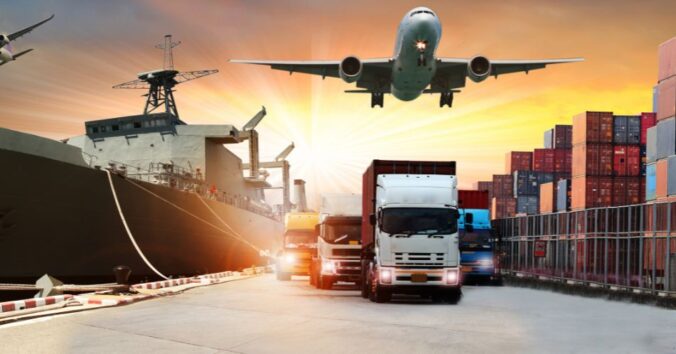The digitalization of the supply chain – more than an challenge, a requirement.

On November 15th and 16th, the Supply Chain Event took place in Paris, welcoming SMEs, ETIs and large companies within a human-sized event with the aim of exchanging on the essential digital transformation that must take place within the Supply Chain.
Our teams were present at the show and were able to participate in the “Digital Roadmap” session presented by Jean-François SALLES – VP of Supply Chain at Renault Group and Hans-Friedrich ZEH – VP Industrial Excellence at Danone Group.
Return on this workshop and their speeches.
Speech of Jean-François SALLES of the Renault Group :
Mr. Jean-François SALLES from the Renault Group explains that the digitalization of the Supply Chain within Renault has already been underway for a while and that the car manufacturer did not wait for the different crises we have to face today.
Indeed, the Renault group has developed an ambitious strategy to achieve carbon neutrality by 2050 but not only that, the digitalization of the Supply Chain represents a real challenge for the group.
As external constraints are catching up with companies more and more, such as Covid, conflicts (Russia & Ukraine, China & Taiwan…) and crises (energy, transport, raw materials and rare materials), it has become necessary to question globalization and to no longer depend on supplies from around the world, as it is the Supply Chain that is in the front line.
Within the Renault Group, several means have been put in place, such as the “Control Tower”. A control tower allowing the Renault Group to manage its flows in real time.
This “Control Tower” allows the centralization of Supply Chain data in a single location. It can, for example, track vehicles, thus indicating an extremely precise ETA (Estimated Time of Arrival), just as it can track containers during their maritime transfer.
The fact that this control tower is refreshed every 10 minutes, allows it to track vehicles and cargo on the planet in real time.
Moreover, thanks to a partnership with Google & Shippeo, it is also possible to adapt its itineraries according to the weather to avoid and anticipate any problems related to traffic and adapt its route accordingly. Other digital tools also allow to follow the level of coverage of the warehouses, allowing to anticipate the need of the latter.
In parallel, last November, the Renault group entered into a partnership with Dassault to connect its various databases and create a Metaverse (explanation here) of the Industry in order to be able to adapt scenarios with the aim of satisfying customers, gaining in productivity but also reducing CO2 emissions (a highly monitored issue for which the group is investing since, let’s remember, the group’s objective is to reach carbon neutrality by 2050).
As you can see, the Control Tower is a decision support tool that enables real-time management of parts flows by bringing together logistics and production data, with the triple objective of improving customer satisfaction, performance and resilience.
Thanks to this Control Tower, the Renault Group becomes a Technological Company and enters the digital world through an innovative, modern and high-tech Supply Chain.
Speech by Hans Friedriech Zeh from Groupe Danone :
For Groupe Danone, digitalization is a priority. Indeed, customers have more and more requirements and expectations, especially in terms of traceability. Customers want to know where their food comes from, especially when there are more and more products, associated or not, and from different origins, which makes a growing supply chain more complex.
Digitization can bring a lot to the strategic level in the harmonization and de-silencing of data and processes of the four main activities of the Danone Group (water, dairy products, protein products and specialized nutrition).
For example, at the water level, Groupe Danone owns several springs around the world (Aqua, Bonafont, Evian, Volvic, Salus, Hayat, Zywiec Zdros, Font Vella, …); and has a global water management policy: Acting to preserve and restore water resources, now and for future generations. He had to harmonize the Supply Chain system to make the transition from the old way of doing things to the new way of doing things in terms of processes related to the digitalization of the Supply Chain within Groupe Danone.
“Digitalization is not a choice, it is an obligation” explained Mr. Hans Friedriech ZEH.
Groupe Danone has put in place three pillars in the context of the digitalization of its Supply Chain:
- end-to-end demand, supply and financial planning (from raw materials to customer),
- connected and customer-oriented logistics (with the example of the downstream distribution control tower set up in Mexico)
- digitalized purchasing (e-buying, e-catalog)
A common process had to be created to allow its deployment and simplified implementation. Thanks to this digitalization, Groupe Danone can simulate as many scenarios as possible and have a much better vision of what is happening.
For example, with the connected and customer oriented logistics; in Mexico the monitoring system is not very developed, that’s why the control tower of the downstream distribution set up in Mexico City was created. It was all the more necessary due to this lack of monitoring. Mexico is a country that requires technology, it adapts very quickly to these new systems and this system will be implemented in the USA and Europe, which together represent the largest share of Danone’s turnover.
It is necessary to be able to control to be sure that the product will arrive on time and at the right place. Telephones are important tools in Mexico because, firstly, they are highly developed there and, secondly, they make it possible to retranscribe this digital information quite easily, so it is the tool that was favored in this digitization process. We had to seize this advantage and adapt the system accordingly.
Thanks to this tower, Groupe Danone has 95% knowledge of what is happening in its Supply Chain in order to find faults and correct them as quickly as possible.
This monitoring also aims to connect a truck driver with a delivery in order to have the best productivity. The monitoring then allows an anticipation of the needs and thus the system is able to predict which driver must take which cargo, to be able to optimize the human resources of a Supply Chain.
Another concern is online sales, which are becoming very complicated because you have to be one step ahead of the market to satisfy the customer. The digitalization of the process allows to monitor everything and to be sure that the supply chain is respected to be able to have the goods in time and to satisfy the demand of the customers.
The pandemic has been very hard and has had a big impact on the world of logistics, but it is time to evolve and move forward, and Groupe Danone has done so with digitalization. Despite the fact that it has many advantages, it is true that digitization remains very complicated to implement, however the results are following. Groupe Danone has succeeded thanks to the young talent it has recruited. It put them in a startup environment, listened to them, and then they agreed on their objectives, their ideas, and this mix allowed Groupe Danone to digitalize very quickly thanks to the contribution of their knowledge. It only took three months to set up this digitalization system.
Finally, in order to face the energy crisis, as the food industry is one of the most energy-intensive sectors, Groupe Danone has set up a team specialized in the independence of gas and oil supply. The objective being to become energy independent, this is one of the main challenges of the Supply Chain.
The group’s strategy is to invest in bio-gas and Groupe Danone is working on the subject to become energy sober and no longer dependent on the supply of energy from foreign countries and thus become self-sufficient if the energy crisis were to continue over time.
The goal is not to penalize exporting countries but to have an insurance in supply which will allow to see in the long term.
As you can see, there are many ways to digitalize the supply chain. And at SNECI, because of our worldwide presence, we are familiar with these uses.
SNECI and Supply Chain support :
With 70 years of expertise and a presence in 10 countries, we support our customers through our supply chain expertise by managing: transportation, customs clearance, warehousing and invoicing anywhere in the world! Our customers no longer have to manage their logistics operations, saving internal resources and reducing risks. Our common goal is to streamline operations and achieve a 100% service level.
In Logistics our expertise is based on :
- Supply Chain Engineering through the study of different multimodal logistics scenarios
- Packaging specifications and recommendations to optimize the overall cost of the supply chain
- Implementation, operations management (forecasts, inventory management, EDI, repacking, milk run, deliveries, etc.) and daily administration (invoicing, payment tracking, taxes and customs operations) of logistics flows – Click here to consult our detailed RASI
- Tracing of door-to-door logistics flows and customized Incoterms (FCL, LCL, Express etc.)
- Optimization of customs procedures
- Reorganization of factory logistics with our turnkey solutions or technical assistance
- Carbon impact measurement and reduction proposals
We also support our industrial clients and suppliers in sourcing their products worldwide in order to improve their competitive advantage by optimizing their purchases.
Well aware that the international context makes relationships with suppliers increasingly complex, we act in the interests of our customers to not only rationalize costs but above all to preserve margins on existing markets.
In Purchasing, we offer the following solutions :
- Costing to quickly identify and capture purchasing gains
- Local integration simulation: trade-off calculations to optimize your investments while respecting local regulations
- Sourcing of suppliers & Management of tenders (RFI, RFQ)
- Supplier evaluations and audits with follow-up and support planning
- International purchasing and supply management and component trading/brokering
- Global and complex missions such as Design-to-Cost, Make-or-Buy and Monozukuri analysis
As you can see, with 70 years of expertise, SNECI supports manufacturers and suppliers by giving them the means to achieve operational excellence, whether it be on supplier sourcing, auditing, management of complex industrial projects, training & coaching or sorting and reworking, not to mention our purchasing and logistics teams. We can also support our customers on the commercial side through market research, business development…
So if you also wish to have additional information and benefit from SNECI’s support, do not hesitate to contact us via our website or by email laura@sneci.com.





